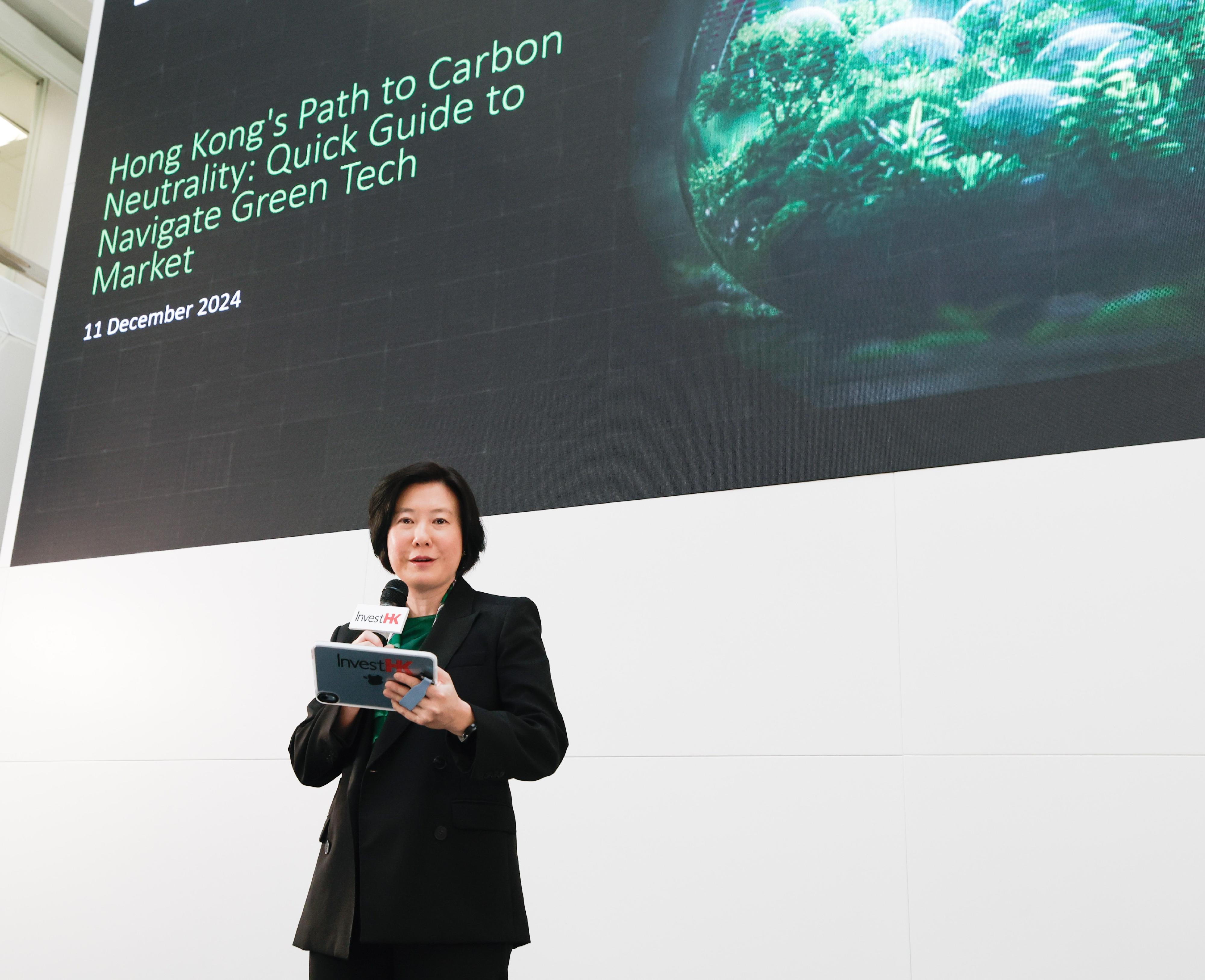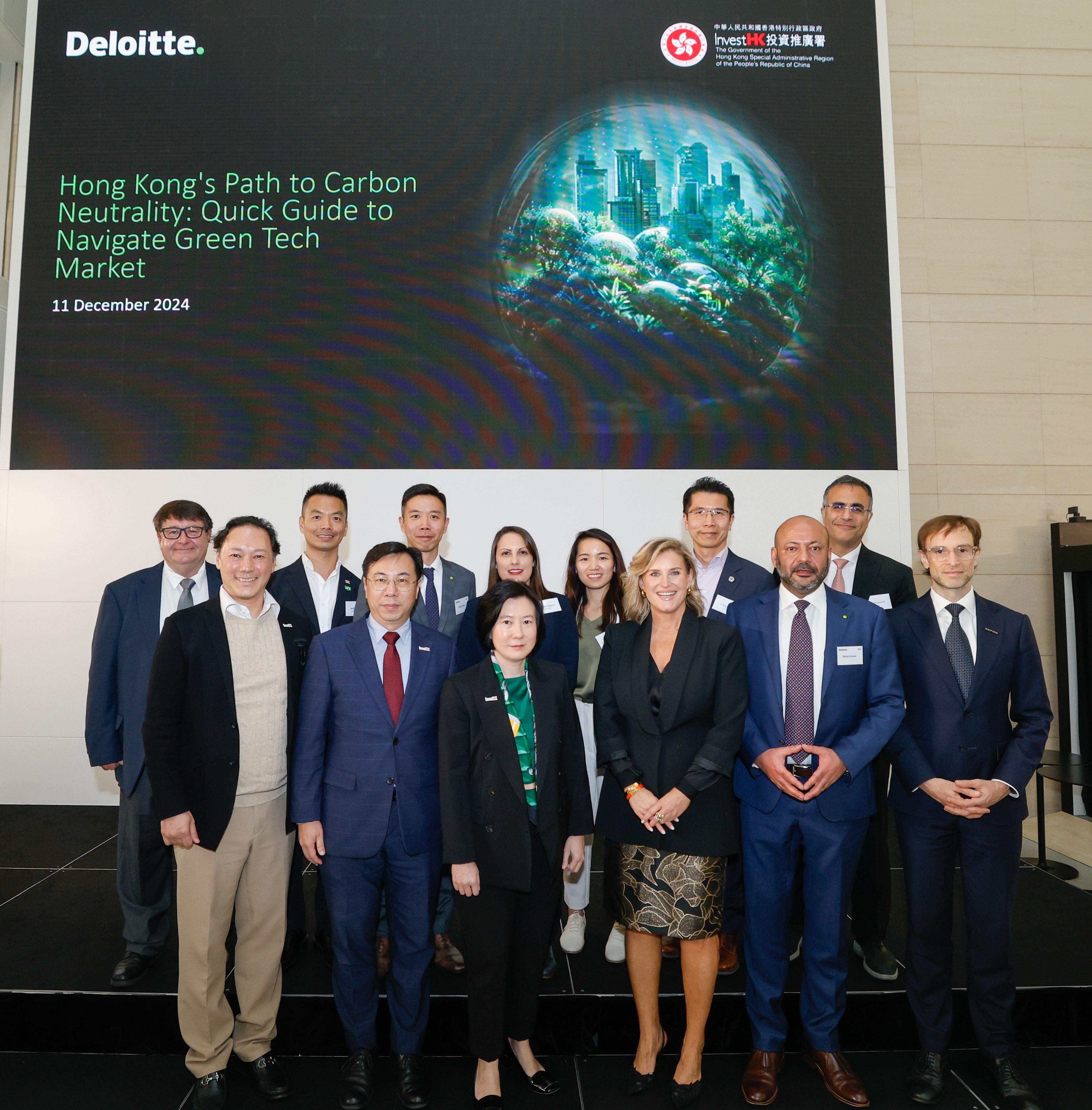Invest Hong Kong (InvestHK) and Deloitte China launched the study "Hong Kong's Path to Carbon Neutrality: Guide to Navigate the Green Tech Market" at an event today (December 11), showcasing Hong Kong's strategic advantages and opportunities in the rapidly evolving green technology sector, along with global investment trends and landscapes. As the global emphasis on climate action intensifies, alongside recent international sustainability commitments like COP29's pledge of US$300 billion in climate finance, Hong Kong is well positioned to capitalise on this momentum by driving regional green tech growth through a focus on five pivotal sectors: power and new energy, green mobility, sustainable built environment, waste reduction and management, and biodiversity.
The event brought together more than 100 industry leaders, investors, sustainability experts, and technology specialists, along with professional service providers, to explore the evolving global trends in climate technology and how Hong Kong can leverage its traditional strengths to become a leading green tech hub. The study also provides recent case studies of overseas green tech ventures that have recently established operations or have business expansion plan in Hong Kong, generating practical insights and approaches for scaling climate solutions in Hong Kong and global markets.
The Global Head of Financial Services, FinTech & Sustainability at InvestHK, Mr King Leung, says, "In the global green tech market, China is emerging strongly, particularly in the Power & Clean Energy sector and Sustainable Built Environment, where China has by far the most patents in the world. Some of these leading companies have already listed and established their international headquarters in Hong Kong. With buildings accounting for the biggest share of energy consumption in Hong Kong, green tech companies are critical for reducing our carbon emissions and embodied carbon through innovation. They can also use Hong Kong as a showcase to accelerate their expansion into other global markets such as the Middle East and Southeast Asia."
The global climate tech landscape is shifting dramatically, with China's share of investment surging from 6 per cent in 2000-2004 to 22 per cent in 2020-2023, while the US share decreased from 76 per cent to 49 per cent. With Hong Kong's strategic position as a gateway between East and West, combined with its deep integration with the Greater Bay Area, the city serves as an ideal destination for global green tech companies seeking to tap into the Mainland market while propelling Chinese innovations onto the global stage. However, key challenges need to be addressed to capture these opportunities.
According to the Greentech Subject Matter Expert Survey, the top three challenges in adoption are weak demand-side push (58 per cent), ecosystem gaps (47 per cent), and limited talent base (47 per cent). To drive green tech development forward, Hong Kong's Climate Action Plan 2050 sets clear policy directions in renewable energy, energy efficiency in buildings, low carbon transport, and waste management. As a leading international financial centre, Hong Kong is well positioned to channel RMB138 trillion needed for China's transition to carbon neutrality by 2050, with the Hong Kong Exchanges and Clearing Limited leading as the largest venue for Chinese offshore green bonds at 46 per cent of total offshore volume.
To unlock Hong Kong's green tech potential and accelerate its journey toward carbon neutrality, InvestHK and Deloitte China released a joint report illustrating the city's strategic advantages across five key sectors:
- Power & New Energy: Hong Kong's electricity generation is transitioning to cleaner sources, with 25 per cent currently supplied by the zero-emission nuclear sources, while experts suggest renewable energy potential beyond the government projections of 3-4 per cent. With global green energy investments hitting US$1.1 trillion in 2022 and China dominating solar manufacturing, Hong Kong is well placed to advance smart grid and storage technology development.
- Green Mobility: Public transport accounts for 90 per cent of daily passenger movements in Hong Kong, where transport contributes 20 per cent of total emissions. In a sector attracting US$8.95 billion in global investment, the city's extensive transport network creates an ideal testbed for sustainable transport solutions, from transport electrification to autonomous systems integration, and mobility-as-a-service platforms, aligning with China's leadership in electric mobility innovation.
- Sustainable Built Environment: Hong Kong leads globally with around 42 000 buildings, including 8 000 high-rises and over 1 500 skyscrapers, with 30-50 per cent of carbon emissions coming from construction. The sector presents massive investment potential, with the global zero-energy building technology market set to surge from US$72 billion to US$403 billion by 2031, supported by China's leadership in green building patents.
- Waste Reduction & Management: Hong Kong's per capita waste generation exceeds neighbouring cities such as Tokyo, Seoul, and Taipei, creating urgent demand for innovative solutions. Recent developments in local recycling infrastructure and emerging business initiatives are accelerating the adoption of waste-to-energy technologies and circular economy solutions.
- Biodiversity: With over 40 per cent of land designated as protected areas, Hong Kong's rich natural environment combined with its advanced research capabilities creates opportunities for environmental innovation. Ten companies have committed to Taskforce on Nature-related Financial Disclosures for 2024/2025, with growing demand expected for tech solutions in digital species monitoring and biodiversity impact measurement.
Deloitte's research highlights critical enablers for green tech development, with strong government support (47 per cent) emerging as the leading factor, followed by access to funding (53 per cent) and ecosystem readiness (47 per cent). Hong Kong's strengths as a leading financial and innovation hub make it well positioned to capitalise on these success factors, particularly through its financial ecosystem that combines both global reach and market depth. With HK$35.5 trillion in assets under management in which 65 per cent comes from international funding, along with its position as Asia's second-largest private equity market, the city offers a robust foundation for scaling green tech solutions.
Deloitte China Hong Kong Sustainability & Climate Leader Mr Mohit Grover says, "Our analysis reveals that Hong Kong's unique ecosystem positions it to pioneer the next generation of climate solutions. Beyond just having the right capabilities, we're seeing real momentum in how our city is bringing together technical innovation, policy support, and market demand. This convergence creates exceptional opportunities for green tech companies to develop, test, and scale their solutions. What's particularly compelling is how Hong Kong can serve as a dynamic platform for sustainable urban solutions, offering practical insights and implementation models for other Asian cities."
Deloitte Global GreenSpace Tech Leader Ms Andrea Culligan says, "The global green tech landscape is experiencing a fundamental shift in how solutions are developed and scaled. What sets Hong Kong apart in this evolution is its ability to bridge Western capital with Asian innovation. The city's deep understanding of regional sustainability challenges, combined with its sophisticated financial infrastructure, creates unique advantages for companies looking to capture opportunities in Asia's fastest-growing markets. We're seeing increasing interest from international players who recognise Hong Kong's strategic value in their global expansion plans."
Building on these foundations, Hong Kong is accelerating its development as a green tech hub through enhanced research and development support, expended funding mechanisms for start-ups, and strengthened collaboration across academia, industry and government. With the city's unique combination of financial strength, technical expertise, and strategic location, Hong Kong is poised to lead the next wave of sustainable innovation in Asia, turning climate challenges into opportunities for growth and positive impact.
Click here to download the report.
Follow this news feed: East Asia








